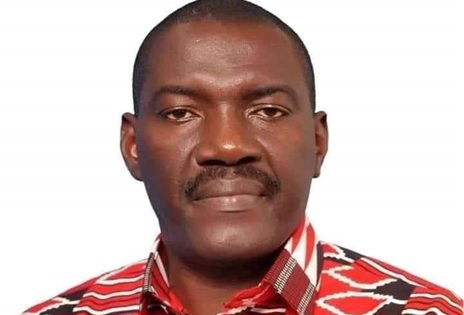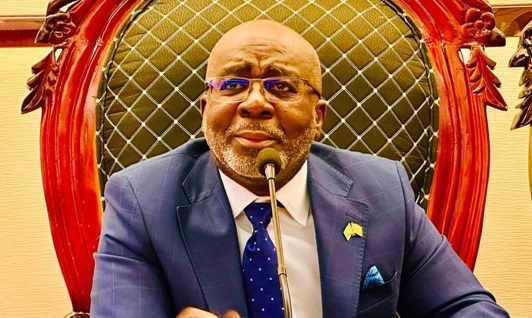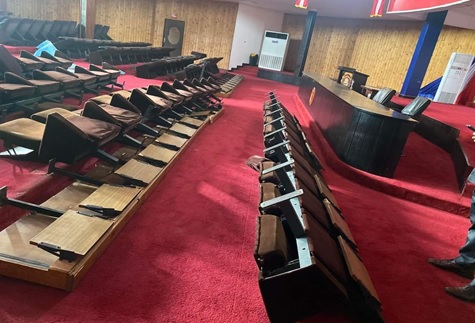MONROVIA, LIBERIA – In a bold and critical statement on Sunday, November 10, 2024, Senator James Biney of Maryland County has made clear his position on recent controversies surrounding the House of Representatives (HOR) and the budget process. His response, aimed directly at Senator Augustine Chea of Sinoe County, emphasizes the constitutional balance of power within Liberia’s legislature and reflects concerns about both procedure and precedent as the country navigates political turmoil.
Senator Biney opens by disagreeing with Senator Chea’s call for the Senate to involve itself with Speaker Koffa amidst mounting tensions in the House. Biney emphasizes that Justice Chamber has deemed the issue “political,” a perspective he concurs with, cautioning the Senate to tread carefully in matters involving the House. Extending this caution to President Joseph Boakai, he warns against any executive interference that could misinterpret constitutional provisions, particularly when political pressures are high.
Biney refers specifically to Articles 29 and 33 of the Liberian Constitution to argue that legislative authority rests solely in the hands of the majority within each chamber. Article 29 establishes that legislative power lies with the two houses of the Legislature, while Article 33 states that a simple majority of each house constitutes a quorum. These provisions, he argues, underscore that quorum-based decision-making does not rely on the presence of any specific individual, including the Vice President, Speaker, or Senate Pro Tempore. He highlights, “The constitution did not say that the Vice President, the Speaker, or the Pro Tempore has to be present for decisions of the majority to be deemed legal.”
To illustrate this, Biney recounts an instance when he, as Chair on Executive, presided over the passage of the recent recast budget while the Vice President was present in the building. For Biney, the moment highlighted the principle that “the power of democratic legislatures is vested in the majority, irrespective of who is Vice President, Speaker, or President Pro Tempore at the time.”
The senator further argues that submitting the budget to the Speaker’s office is unnecessary if the Speaker lacks authority, in the absence of a quorum, to make binding decisions for the House. In Biney’s words, “Of what effect, essence, or use, therefore, will submitting the budget to the Office of the Speaker be to the country if he or she can do nothing with it?” He acknowledges that while procedural norms generally favor routing communications through the Speaker’s office, such traditions are grounded in “normal conditions.” In his view, the current atmosphere in the House is “abnormal and unusual,” making it practical to bypass the Speaker in addressing matters of urgency, such as the budget.
Another of Biney’s key points challenges the notion that submitting the budget to a specific office—be it the Speaker’s or otherwise—is constitutionally mandated. He asserts that the Executive is within its rights to submit the budget to the Chief Clerk of the House or the Secretary of the Senate. “These two are the ones to whom all communications addressed to the legislature are given for presentation to plenary,” he argues. Biney maintains that the constitutional requirement is merely a simple majority vote within each House under a presiding officer, not necessarily the Speaker or Pro Tempore.
A particularly sharp note is sounded when Biney suggests that any decision by President Boakai to prioritize the Speaker’s office over the majority within the House could backfire politically. He warns that “the simple mistake of the President ignoring the authority of the majority could cause his or her presidency unimaginable consequences in terms of subsequent decisions of the majority.” Ultimately, Biney emphasizes that the Speaker, Vice President, or Senate Pro Tempore are inconsequential to the core process, and what truly matters in a democratic legislature is the “support of the majority of each house.”
In closing, Biney acknowledges that his remarks deliberately avoid the separate and divisive topic of Speaker Koffa’s potential removal. He admits that certain measures may be required to move the country forward but refrains from commenting further on this matter. His letter, while rooted in constitutional analysis, implies a need for unity and adherence to procedural norms to maintain stability within Liberia’s government, especially as it faces critical decisions that could shape its legislative landscape.
Senator Biney’s arguments underscore the precarious balance between procedural formality and functional governance, stressing that Liberia’s legislative process must prioritize majority decision-making over traditional roles, especially in uncertain times. His reflections point to an overarching desire for careful and constitutionally grounded leadership that respects the dynamics of both houses while safeguarding the effectiveness of Liberia’s democracy.







